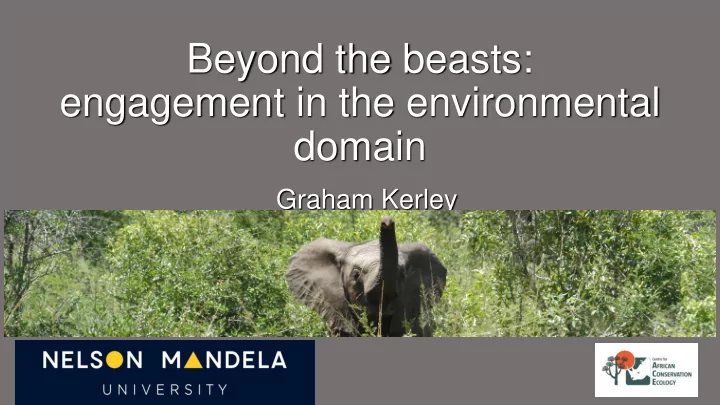

Beyond the beasts: engagement in the environmental domain Graham Kerley
Two faces of the environment Supporting Society Threatening Society Environmental Engagement will be key to supporting societal well-being • Grysbok Environmental Education Trail • Capacity Building for elephant decision makers • Scientific Assessment on Livestock predation in South Africa
Grysbok Environmental Education Trail
Capacity Building for elephant decision makers • Two courses in 2017
Livestock Predation and its Management in South Africa: A Scientific Assessment Shale Gas SEA Research Decision-makers Governments Intergovernmental Panel Private Sector on Climate Change Assessment Civil Society (IPCC) Individuals Monitoring Science Millennium Ecosystem Scientific Assessment: Assessment Elephant Management
Why Livestock Predation? • Livestock losses > R2 billion/year • Costs carried by individual farmer • ~ 2 million communal livestock farmers • ~ 35 000 commercial livestock farmers • Impacts on rural livelihoods, employment and food and fibre security • Especially in marginal farming areas • contributes to social tensions • Management approaches are contentious • Animal welfare • Effectiveness
Livestock Predation and its Management in South Africa: A Scientific Assessment Hosted by: Funded by: In collaboration with:
History • 2012: Project conceived (G. Kerley, A. Aucamp, A. Boshoff) • 2012 to 2016: funding raised; • 2016: Team assembled (G. Kerley, D. Balfour & S. Wilson); • 2016: Ministerial endorsement (Environment & Agric.); • 2016: Project launched at NWGA Congress. • Website developed http://predsa.nmu.ac.za/ • 2018: Assessment completed
Process and Governance Ministry of Environment and other funders Management team Process Custodian Group Leader: Graham Kerley 6 + chair from Govt., Industry, Manager: Dave Balfour NGOs & research Assistant: Sharon Wilson Reviewers Experts Reviewers Stakeholders Issue Team 1 Issue Team 2 Issue Team … Lead author Lead author Lead author Author Author Author Contributing authors Contributing authors Contributing authors
The drafting and review process Internal Zero Draft Review by other Assessment Participants First Draft Documented Expert review comment responses Second Draft Documented Expert and comment Stakeholder responses review Final Draft Governing body acceptance of summary, conformity of body text, copy editing Published
• Compiled as a book • 42 authors • 22 institutions across SA • Technical review • 24 expert reviewers • Stakeholder review
Outcomes? • Comprehensive assessment, global first • Economic impacts may be relatively small in terms of GDP, but high at the individual farmer scale, with impacts on the rural economy, employment and food security • Commercial and communal livestock farmers face similar predation challenges • Predation management rather than predator control • No simple solution to managing livestock predation • Legislation and regulations need overhaul • Adaptive management approach needed to better use existing information • Collaborative relationship between livestock managers, researchers and policymakers • Policy needs to take into account the “shifting baselines” around the issue.
Engagement leading to scholarly outputs Fully peer- reviewed DHET Subsidy
Recommend
More recommend